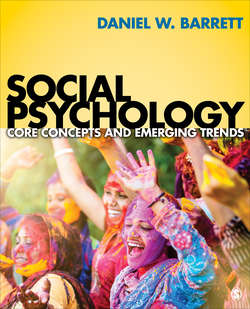Читать книгу Social Psychology - Daniel W. Barrett - Страница 21
На сайте Литреса книга снята с продажи.
Social Psychology Matters: Defining The Field
ОглавлениеWhat is social psychology? Before offering a definition, let’s briefly discuss the nature of definitions. Definitions can be tricky, because they are immensely important yet at the same time exceedingly trivial. They are important because they provide a mini snapshot of the field, a first exposure for the new student. Definitions matter because we need to be able to agree on what we are talking about—we need a common language so that we can understand each other. Yet definitions are trivial as well (this is heresy coming from an academic), because there are often many ways to define a single word, concept, or scientific discipline. Definitions are not set in stone but instead evolve over time. Moreover, definitions are somewhat independent from actual work in a field: The science, teaching, and practice of social psychology will continue to take place in thousands of laboratories, classrooms, and applied settings around the globe regardless of how a particular person or book defines social psychology. In the end to be useful, definitions must provide clarity, be generally agreed upon, and serve as a launching point for further investigation. Now let’s move onto our definition of social psychology.
The person in the crowd In the modern world, it can be difficult to develop a sense of individuality and self-determination in the midst of social pressures to conform.
Geoff Tompkinson / Science Source.
Social psychologists seek to understand how other people affect the behavior, thoughts, and feelings of individuals. We might examine, for instance, how a person’s Facebook friends affect what she posts online or how being the lone minority member of a group affects that member’s thoughts about himself. In both of these cases we ask about social aspects of human existence: people influencing individuals. The emphasis on social distinguishes our discipline from other domains of psychology, and social is of course the core concept in our field: Social psychology is the scientific study of the social experiences and behaviors of individuals. Let’s examine each element of this definition.
First, social psychology is a science: It relies on the rigorous application of scientific methods in the same way that physics or biology does. Like these other sciences, social psychology is not a collection of commonsense, simple observations and intuitive ideas. Rather, it is a systematic examination of social phenomena that utilizes both traditional and novel scientific methods involving careful experimentation, advanced technology, and sophisticated statistical analyses (and sometimes develops new ones). For example, we investigate the sexual orientation of many people using rigorous research, as opposed to merely asking opinions from a few individuals.
Second, social psychology focuses on individuals rather than groups. For instance, we are interested in how a crowd affects its members but not in how one crowd influences another crowd. Third, we’d like to understand the ways in which individual social behavior is affected by others. Social behaviors are observable actions that stem from the direct or indirect influence of others. With regards to sexual attraction, one question social psychologists would try to answer is how other people impact who we are attracted to.
Finally, social psychologists study the individual’s social experiences. The term experience encompasses conscious thoughts and feelings as well as nonconscious processes, brain activation, and hormone regulation. Thus, neurophysiological changes that are neither self-reportable nor obvious to an independent observer—say, activation of the amygdala—are included in this definition. We’ll have much more to say about nonconscious processes later, but for now, suffice it to say that we are not always aware of how others affect our thoughts, feelings, and behavior. Again returning to our opening vignette, social psychologists are likely to examine how both conscious and nonconscious processes affect to whom we are attracted.
In sum, social psychologists investigate how people influence the social experiences and behaviors of other humans. For the sake of simplicity, I will often shorten “social experiences and behaviors” to “social behaviors” and will make it clear when I am referring only to observable actions. What social psychology is and is not will be further clarified below when we contrast it with other branches of the social sciences and of psychology.
[Dear Student: I have placed Think Again! questions throughout the text in order to help you gauge your comprehension of and memory for what you have just read. I urge you to try to answer each question you encounter right away—preferably by writing it down—and, if needed, to look back at the chapter to solidify your understanding.]
